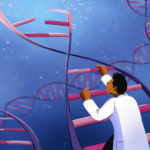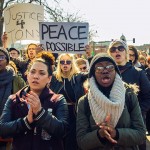By NICOLE WINFIELD and ARON HELLER
Associated Press
JERUSALEM (AP) _ Pope Francis wrapped up his Mideast pilgrimage Monday with a balancing act of symbolic and spontaneous gestures to press his call for peace between Israel and the Palestinians and friendship between Jews and Muslims in the land of Jesus’ birth.
A day after he boosted Palestinian aspirations by praying at Israel’s security barrier surrounding Bethlehem, Francis honored Holocaust victims by kissing the hands of several survivors, and accepted Israel’s last-minute request to pray at a memorial to victims of suicide bombings and other attacks.
But the image that the Vatican hopes will define the trip, and perhaps Francis’ young papacy, was another: that of the leader of the 1.2 billion strong Catholic Church embracing his Argentine friends, a rabbi and a Muslim, in front of the Western Wall, adjacent to the disputed hilltop compound that lies at the heart of decades of Israel-Arab tensions.
After visiting the golden-topped Dome of the Rock shrine on the compound on Monday morning, Francis prayed at the nearby Western Wall, leaving a hand-written note with the “Our Father” prayer written in his native Spanish in between the cracks of stone.
When he finished, a visibly emotional Francis embraced Rabbi Abraham Skorka and Omar Abboud, a leader of Argentina’s Muslim community, both of whom joined Francis on his official delegation in a potent symbol of interfaith friendship.
“I think this was the real answer to such problems that come from very long and profound difficulties,” the Vatican spokesman, the Rev. Federico Lombardi, said of the embrace. “What can we do? We can pray. We can ask God to help us. We can love mutually and then embrace.”
That logic lies at the heart of Francis’ surprise invitation to the Israeli and Palestinian presidents to come to the Vatican next month to pray for peace. The invitation was a dramatic _ but very Franciscan _ initiative that confirmed that the pope who named himself after the peace-loving St. Francis of Assisi feels free and even obliged to pursue any initiative that might benefit peace.
Francis stressed in comments to reporters en route back to Rome that the encounter was to pray _ not negotiate or mediate.
“We are coming just to pray, then everyone goes home,” he said. “But I think prayer is important: praying together.”
Francis made a similar foray into world diplomacy last year when he rallied millions of people to fast and pray for a peaceful resolution to threatened U.S.-led military strikes on Syria. More recently, the Vatican has intervened directly in Venezuela’s unrest by participating in talks between the government and the opposition.
In the case of the Vatican prayer meeting, Palestinian President Mahmoud Abbas and Israeli President Shimon Peres readily accepted the invitation, and Peres and Francis discussed the encounter during a lengthy meeting at the president’s office.
“The humility in your nature and the power in your spirit raised a spiritual elation and a thirst for peace,” Peres told him at a ceremony in the garden of the presidential residence.
The prospects of any breakthrough at the Vatican meeting next month are slim. Peres, a 90-year-old Nobel peace laureate, holds a largely ceremonial office and is set to step down this summer. But the pope’s gesture seemed to send a powerful message to the region’s leaders not to give up, weeks after the latest round of peace talks collapsed.
The atmosphere was starkly different in Francis’ one-on-one with Israeli Prime Minister Benjamin Netanyahu, who has expressed anger with politicians who have reached out to Abbas at a time when the Palestinian leader is reconciling with the Islamic militant group Hamas. Israel considers Hamas, which controls the Gaza Strip, a terrorist group.
In his talks with Francis, Netanyahu lauded Israel’s treatment of Christians and defended its West Bank separation barrier. Israel says the structure is a security measure. The Palestinians say it has gobbled up their land and stifled their economy.
“When incitement and terror against Israel stops, there won’t be the need for the security fence which has saved thousands of lives,” Netanyahu said.
The conversation turned awkward after Netanyahu told the pope that Jesus spoke Hebrew.
“He was speaking Aramaic,” the pope replied with a smile. “He spoke Aramaic, and he also knew Hebrew,” Netanyahu said.
After Francis made an unscheduled stop at the massive concrete barrier on Sunday, Netanyahu asked Francis to deviate from his whirlwind itinerary to pray at Jerusalem’s Victims of Acts of Terror Memorial, which includes the names of hundreds of civilians killed in Palestinian and Arab attacks since 1851, Lombardi and Netanyahu’s office said.
As he did at the separation barrier and the Western Wall, Francis bowed his head in prayer and placed his hand on the stone. Lombardi said he then delivered a sweeping denunciation of terrorism in all its forms.
At Yad Vashem, the pope prayed before a crypt with ashes of Holocaust victims and laid a wreath of yellow and white flowers in the “Hall of Remembrance.”
Upon his arrival in Israel after visiting the West Bank, Francis clearly condemned the slaughter of 6 million Jews during the Holocaust, making up for what many Jews felt was a tepid speech from the German Pope Benedict XVI during his 2009 visit to Yad Vashem.
On Monday, his actions almost spoke louder than his words. In one of the most poignant moments of the trip, Francis kissed the hands of six Holocaust survivors as he heard their stories.
“Never again, Lord, never again!” Francis said. “Here we are, Lord, shamed by what man _ created in your own image and likeness _ was capable of doing.” He repeated that phrase in writing in the memorial’s guest book.
Joseph Gottdenker, born in Poland in 1942, said he briefly told the pope how he was saved as a boy by Catholics who hid him during the Holocaust. Gottdenker, who now lives in Canada, said the meeting was more emotional than he expected.
“The Catholic people who saved me and risked the lives of their whole families to save me, they are looking down today and proud to see me meet the leader of their faith,” Gottdenker said.
Yisca Harani, an expert on Christianity in the Holy Land, said she was disappointed with the visit. While the pope arrived to celebrate peace, he was instead greeted by two angry parties who tried to pull him in their direction.
“I expected someone stronger. I expected some strong words of encouragement or a real push,” she said. “I found a frail pope. There were very few moments when I saw his face lit up. From the moment he landed he looked afraid.”
Israeli police say a prayer book was set on fire in an apparent arson attack at a Jerusalem church near a sensitive holy site Monday where Pope Francis celebrated mass.
Police spokesman Micky Rosenfeld says an eyewitness saw a man enter the Dormition Abbey and light candles before fleeing the scene. The suspect’s identity or motive was not immediately known.
In the run-up to the pope’s visit, there have been a number of hate attacks directed against Christian holy sites and properties.
Nikodemus Schnabel, the church spokesman, said a book of personal prayers was set on fire. A wooden bench and small crosses nearby also caught on fire, causing little damage.
He said the fire took place after the Pope finished mass at a nearby holy site revered by Christians as where Jesus had his Last Supper, and by Jews as the tomb of the biblical King David.
Religious Jewish nationalists have protested in recent days because the Vatican is pressing for more access to the site.
___
Associated Press writer Ariel David contributed to this report.











